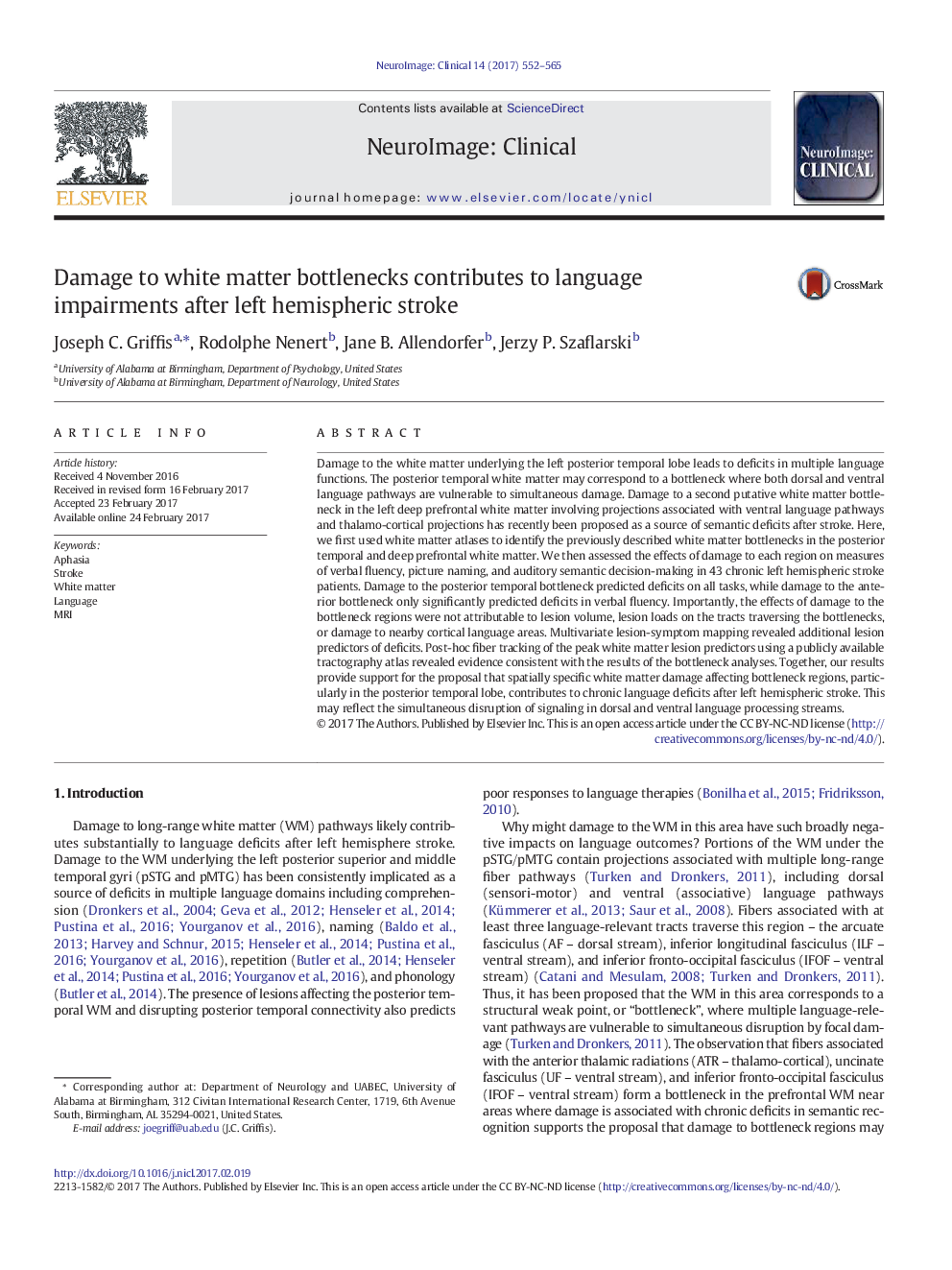ترجمه فارسی عنوان مقاله
آسیب به تنگناهای ماده سفید باعث اختلال در زبان می شود پس از سکته مغزی نیمکره چپ
عنوان انگلیسی
Damage to white matter bottlenecks contributes to language impairments after left hemispheric stroke
| کد مقاله | سال انتشار | تعداد صفحات مقاله انگلیسی |
|---|---|---|
| 115173 | 2017 | 14 صفحه PDF |
منبع

Publisher : Elsevier - Science Direct (الزویر - ساینس دایرکت)
Journal : NeuroImage: Clinical, Volume 14, 2017, Pages 552-565
ترجمه چکیده
آسیب به ماده سفید زیر بغل لبه خلفی چپ منجر به نقص در عملکرد چندین زبان می شود. ماده سفید موقت خلفی ممکن است با تنگنا باشد که در آن مسیرهای زبان پشت و زاویه ای آسیب پذیر هستند تا آسیب های همزمان. به علت کمبود معنایی پس از سکته مغزی، اخیرا به عنوان یک منبع کمبود معنایی پیش بینی شده است که آسیب به ماده تاریک ماده سفید پیش بینی شده در ماده ی سفید سفید پیش ماده پیشانی، شامل پیش بینی های مربوط به مسیرهای زاویۀ زبان و پیش بینی های تالامو کورتیکال است. در اینجا، برای اولین بار از وانتهای ماده سفید استفاده شدیم تا تنگناهای ماده سفید که قبلا شرح داده شده بود در مواد سفید سفید پیشانی و عمیق خلفی شناسایی شود. پس از آن، اثرات آسیب به هر منطقه بر روی اقدامات روایی کلامی، نامگذاری عکس و تصمیم گیری معنایی شنیداری در 43 بیمار مبتلا به سکته مغزی نیم تنه چپ مزمن بررسی شد. آسیب به تنگنای موقتی خلفی پیش بینی کمبود در تمام وظایف، در حالی که آسیب به تنگنا قهوه تنها به طور قابل توجهی پیش بینی کمبود در روایت کلامی. مهم این است که اثرات آسیب به ناحیه تنگنا ناشی از حجم ضایعه، بارگذاری ضایعات در دستگاه های عبور از تنگناها یا صدمه به ناحیه زبان کورتیکال نیست. نقشه برداری ضایعات چند جانبه نشان دهنده ضعف های اضافی بود. ردیابی فیبر پس از فاکتورهای پیشگیری از ضایعات قله سفید با استفاده از یک آثار رسمی عمومی آثار با شواهد منطبق با نتایج تجزیه و تحلیل تنگنا نشان داد. با هم، نتایج ما حمایت از این پیشنهاد را ارائه می دهد که آسیب ناشی از مواد مکانیزه سفید خاصی که در مناطق تنگنا رخ می دهد، به خصوص در لوب قدامی خلفی، به کمبود مزمن زبان بعد از سکته نیم کره چپ کمک می کند. این ممکن است منعکس کننده اختلال همزمان سیگنالینگ در جریان پردازش زبان پشت و شکمی باشد.

